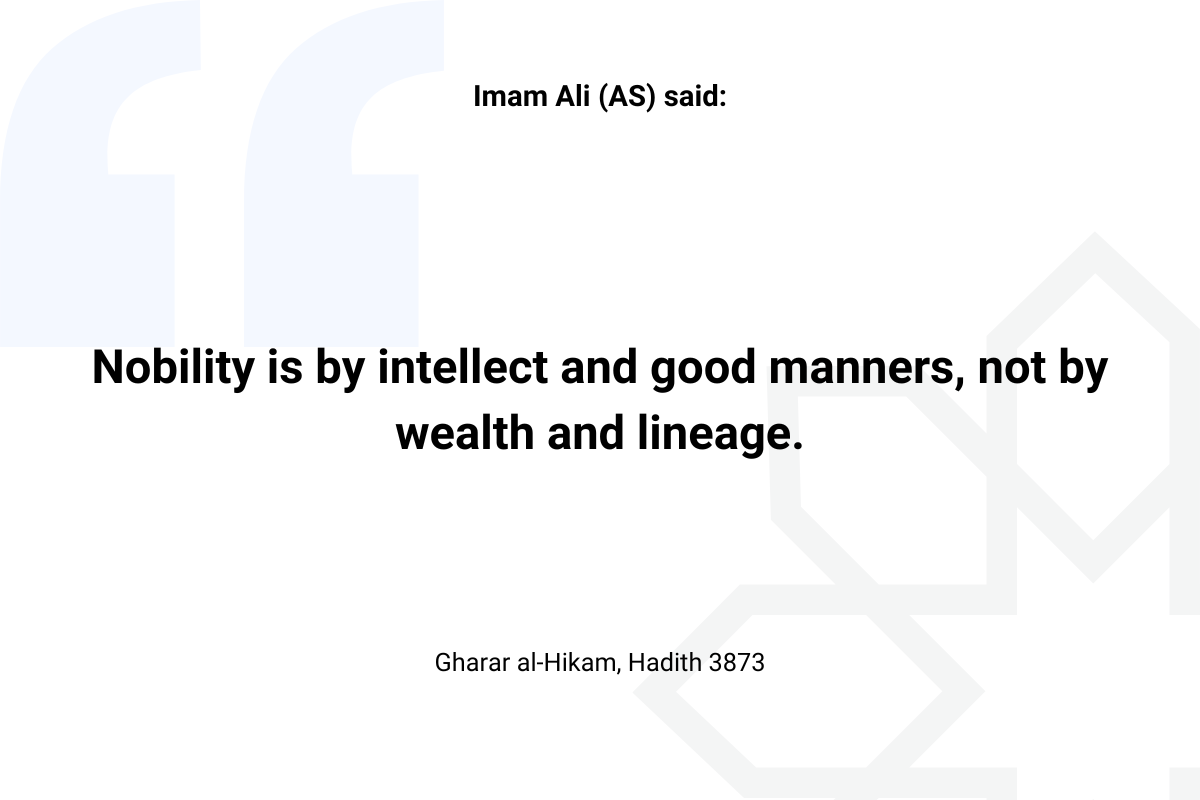Imam Ali (AS) said: “Nobility is by intellect and good manners, not by wealth and lineage.” (Gharar al-Hikam, Hadith 3873)
In Islamic teachings, the value of knowledge, wisdom, and good manners is paramount. The noble saying from Imam Ali (AS), the first Imam of Shia Muslims, encapsulates this beautifully. This article delves into the depths of this hadith, providing a comprehensive interpretation while integrating key Islamic keywords and phrases for a broader understanding and better SEO performance.
Understanding True Nobility in Islam
The Value of Intellect and Wisdom
In the realm of Islamic teachings, intellect (‘aql) is highly esteemed. It is considered the greatest gift from Allah, allowing humans to discern right from wrong and to pursue knowledge. Imam Ali’s saying emphasizes that true nobility and honor stem from one’s intellectual and moral qualities rather than material possessions or family background. This concept is central to many Islamic quotes and hadith, highlighting the importance of knowledge and wisdom in achieving a noble character.
The Role of Good Manners
Good manners (adab) are another critical aspect of this hadith. In Islam, adab encompasses a wide range of behaviors, including respect, kindness, humility, and proper conduct. These attributes are essential for building a righteous and harmonious society. Islamic quotations often stress that adab is a reflection of one’s faith and inner nobility, surpassing the superficial measures of wealth and lineage.
The Superficiality of Wealth and Lineage
Contrary to the societal norms that often equate nobility with wealth and lineage, Islam teaches that these are transient and superficial. Wealth can be fleeting, and lineage is something one inherits without personal effort. Therefore, placing value on these aspects is misguided. Instead, Islam encourages believers to cultivate intellectual and moral virtues that have lasting significance.
Practical Implications for Muslims Today
Fostering Intellectual Growth
Muslims are encouraged to seek knowledge continuously, as it is a means of attaining a higher status in the eyes of Allah. This pursuit is not limited to religious knowledge but includes all beneficial knowledge. Engaging in regular study, reflection, and seeking wisdom from diverse sources are ways to embody the essence of this hadith.
Cultivating Good Manners
Good manners should be evident in every interaction, whether with family, friends, or strangers. Simple acts of kindness, patience, and respect are powerful demonstrations of one’s character. The hadith reminds Muslims that these qualities are the true markers of nobility.
Conclusion
Imam Ali’s profound statement serves as a timeless reminder of what constitutes true nobility in Islam. By valuing intellect and good manners over material wealth and lineage, believers can achieve a higher moral and spiritual standing. This hadith aligns with numerous other Islamic quotes and teachings, emphasizing the enduring importance of inner virtues over external attributes.
For more inspiring islam quotes, visit our dedicated page.
By understanding and internalizing the essence of this hadith, Muslims can aspire to lead lives marked by true nobility, guided by intellect and good manners.








